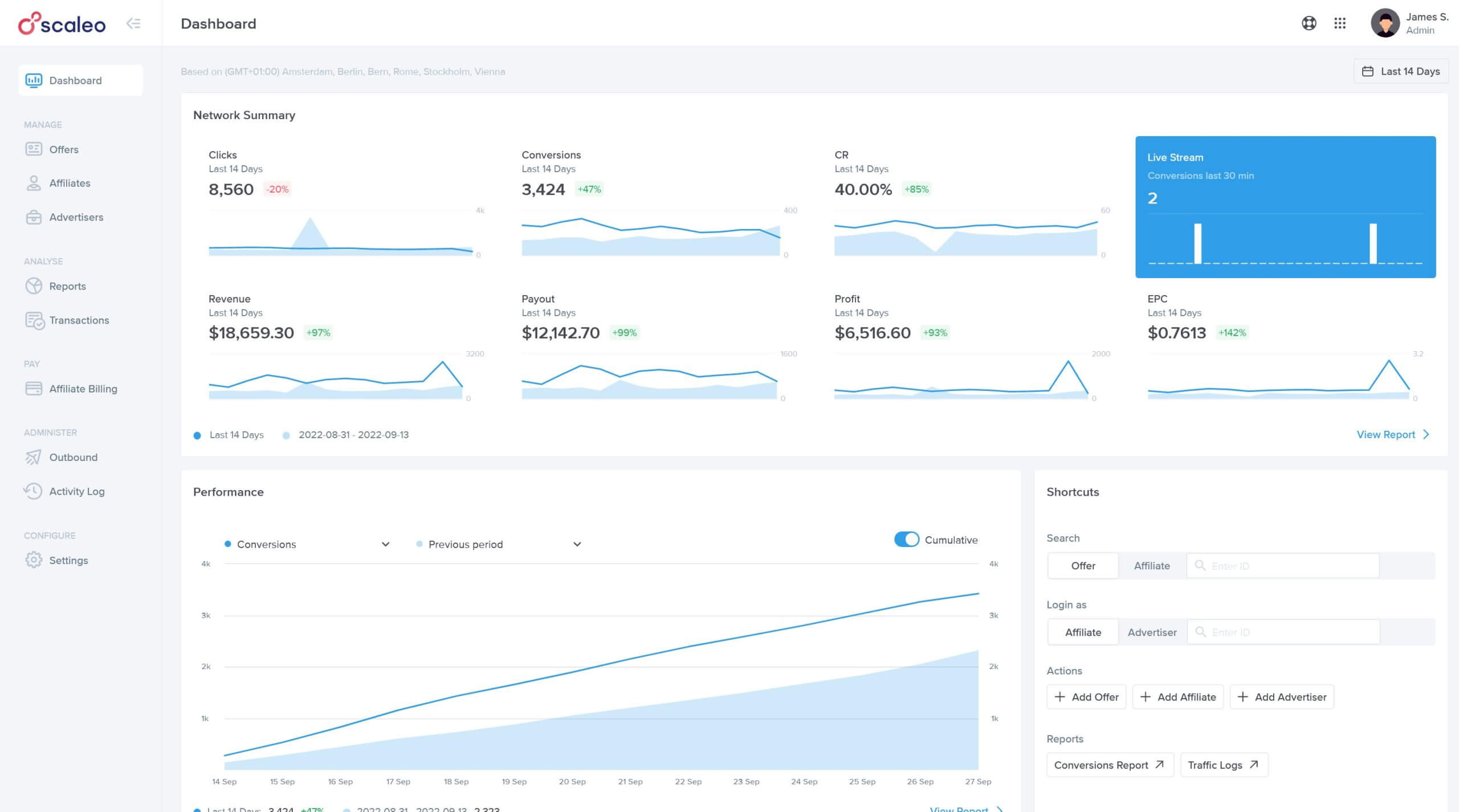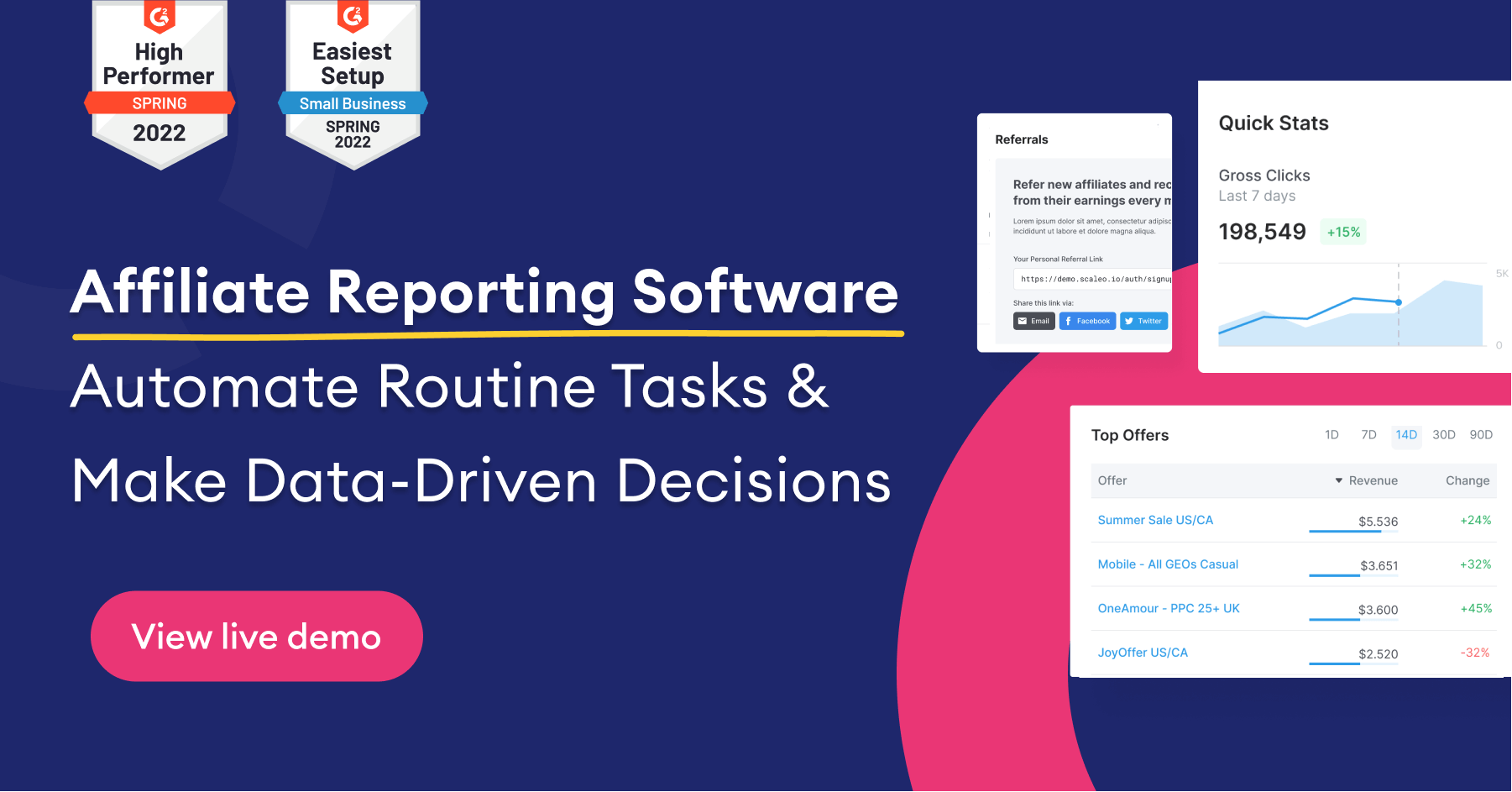Partner marketing software gives your company the partner platform it needs to track affiliate sales and campaigns, as well as all the tools you need to build your partner marketing strategy. Every partner has their own private dashboard through which they can access campaign materials, links, deals, affiliate promotions, and news.
Partner marketing software, also sometimes referred to as partner relationships management or, in short – PRM software, can help sales managers build better relationships with partners like value-added resellers and specialty shops.
Today we will discuss the advantages and disadvantages of having a partner software in place, how to choose the right one, and what it can do for your business.
10 Best Partner Marketing Software in 2023
Here are the 10 most popular PRM (partnership marketing software) that have been tested and proven this year:
| Name | What is it? | Starting price |
|---|---|---|
| Scaleo | Premium all-in-one partner marketing software | $299/mo |
| Referral AI | AI-powered referral generation | $35/mo |
| MentionMe | Premium affiliate referral software | on request |
| Peerclick | Partner ad tracker | $99/mo |
| WeCanTrack | Free affiliate partner software | free |
| InviteReferrals | Social media partner marketing tool | $99/mo |
| FriendBuy | Simple referral software for partnerships | $249/mo |
| 8b.io | Free link tracker for social media partnerships | free |
| LinkTrack | Simple and free partner link tracker | free |
| AffTrack | Free partner link tracker | $199/mo |
Now, there are a lot of partner software products on the market, from fundamental free ones to high-end premium vendors.

Any area of a company that deals with third-party vendors, such as consultants, professional marketing services, transportation companies, distribution centers, and off-site warehouses, can benefit from partner marketing software.
It gives excellent results when used with other tools that track engagement and partner pipeline growth.
What Exactly is Partner Marketing?
Partner marketing is a strategic collaboration in B2B (business to business) or B2C (such as business to consumer) sectors that help distribute finances and opportunities equitably, monitor success and activity and reassure partners that your company is not usurping their leads.
In addition, partner marketing platforms, such as Scaleo, can help track various data points to help you make data-driven decisions. This cooperation’s primary goal is to achieve both parties’ key goals.
What are these goals?
Partners are frequently viewed as “supporters” of the businesses they collaborate with. All businesses want this trusted voice to communicate with current and new customers. Partnering increases brand exposure and visibility, improves lead generation, and assists in reaching a larger audience while partners are getting paid to deliver results.
Advantages of Partner Software

Cost-Effective
You can lower your sales and advertising expenses by implementing partnership programs that provide marketing help to your company. For example, you can partner with leading brands to profit from brand awareness when addressing new customers. This brand-building partnership program model can prove cost-effective for virtually any industry.
Acquire Trust and Reliability
You can increase your company’s trustworthiness and reputation by partnering with reputable brands. This will assist you in impressing your prospects and gaining their patronage. Examine possible business partners’ testimonials and speak with their existing partners to learn about their experiences.
New Growth Pathways
You may reinvent your company and explore new opportunities for expansion by forming new relationships. Furthermore, you can test out new promotion tactics in a safe setting. Another advantage is that you can use your partner’s reputation to reach new audiences and markets to expand your business.
Increase Exposure
You can get even more out of the fact that your partner is well-known by using different channel partner marketing tools. This will allow your business to reap the benefits of its exposure, making your brand more recognizable to potential customers.
Disadvantages of Partner Software
Any strategy has potential disadvantages. There is always a risk of failure when entering into a channel partnership with a company or a person. So, what should you think about it?
For strategic partnerships to work, everyone needs to know what their responsibilities are and what was agreed upon. Without it, building and managing relationships become difficult. The general rule is to treat your partner as you expect them to treat your team or business.

Not all partnership deals go as anticipated. While you can manage business processes and resources from your end, you cannot manage the other entity.
As a result, your partnership contract must cover all specifics and essential steps in the event of such an unfavorable situation. This could include missed deadlines, delays, inability to follow through on agreements, etc. Uncertainty in a partnership agreement always leads to conflict.
Marketing Partnership Types
Partner marketing is a broad phrase encompassing various trends, which we may also refer to as strategies. Selecting the right one for your business is the key to marketing partnership success. So, while they have all been shown to be beneficial, concentrate on the value this partnership delivers to your clients and brand. Let’s look at the list to see what possibilities you have.
Marketing through affiliates
Affiliate marketing is a collaboration in which a company rewards its partners, also known as affiliates, for promoting and selling the company’s products. This is a pay-per-performance partnership, which means the partner is paid only when the desired activity occurs – impressions, clicks, or sales.

Bloggers, influencers, agencies, email marketers, PPC affiliates, coupons, and cashback websites are all common affiliate partners.
While partner marketing is not always strictly bound to conversion, classic affiliate marketing is.
Loyalty schemes
One of the more basic and transparent partnership forms is the loyalty partnership. In this case, the brand works directly with its customers, offering rewards and benefits for frequent or significant purchases.
Loyalty partnership schemes include bonuses collected through retail chain member cards, cashback, and “every tenth product free” type of incentives.
A brand can choose the type of incentive system it wants, whether it’s discounts, free products, or more features.
Distribution partnership
When one brand wishes to leverage another brand’s enormous distribution network in exchange for a fee, they form a distribution partnership. Typically, those products are directed to the same demographic.
Sponsorship
Sponsorships are one of the oldest partnership types in marketing history. As a result, there is a wide range of sponsorship options. However, they all have one thing in common: a sponsor who openly promotes the brand.

In exchange for product promotion, brands might support YouTube producers or sponsor sporting events in exchange for viewability.
In these instances, the brand and the sponsor generate value. However, in the case of negative publicity, both parties suffer. Because of its wide range of applications, sponsorship marketing can be combined with other types of partnership marketing, such as product placement.
Co-branding
This type of marketing partnership entails two brands collaborating on one new or updated product to bring added value to the customer.
Licensing
A licensing partnership occurs when one company permits another to manufacture and sell its products or services under its brand. It may not be easy to comprehend. This is an essential aspect of partner marketing software.
Influencer marketing
Influencers, by definition, can persuade someone to make a buying decision. They don’t have to be from a specific profession or have a significant following. They must, however, earn their audience’s support, trust, and respect.
Actors, singers, bloggers, YouTubers, and Instagrammers, are examples of popular influencers today.
Honesty is the key to successful influencer marketing. It is easy to lose your audience’s trust by recommending products or services you would not use yourself. This can be detrimental not only to the influencer but also to the product or service.
Influencers are generally paid for their endorsements but do not receive recurring commissions like affiliates.
Marketing through content
Content marketing is a crucial aspect of every business, and content partnerships have their place.
It is easier to describe a content partnership by looking at what it aims to accomplish. Regardless of how it was created or marketed, the end product is always a piece of marketing content that serves both brands. Guest writing in exchange for backlinks is one example.
Resellers
Resellers and channel sales partners are sometimes mistaken for affiliates. Although these two forms of partnerships are fundamentally identical, resellers are more involved with the merchant and the product’s deployment. In most cases, their primary function is to assist a merchant in distributing a product to the market.
Collaborations
A joint venture is a partnership formed when two businesses decide to pool their resources to complete a specified job. It could be a project or any other type of business activity.

In the context of the marketing partnership, joint ventures mean that both firms integrate marketing efforts to increase income. These types of alliances increase brand exposure, provide access to new markets, and help cut advertising costs.
Product promotion
We’ve all seen it on TV: an actor sips a branded beverage in the middle of an episode of your favorite show. Coincidence? No, I don’t believe so.
Product placement can be so subtle that you won’t see it, or it can be more apparent when the camera focuses on the advertised product. In today’s society, this appears to be a little too promotional. As a result, it is frequently done in the form of native advertising.
Marketing through referrals
Referral marketing is very similar to affiliate marketing but does not necessitate the same level of commitment. It typically takes the form of word-of-mouth referrals to friends, family, or coworkers. The reward is usually minimal yet appealing enough to persuade individuals to spread the word about your brand and products.
What is partner relationship management (PRM)?
If you decide to add a partner program to your existing business to increase revenue and raise brand awareness as a part of your marketing strategy, there are a few things to be aware of. First, partner relationship management will require additional resources on your behalf.
Just like you have a customer success manager for your clients, you must dedicate a partner manager to the success of your partner engagement. While digital marketing generally does not require that much extra work, just adding a partner portal to your website and setting up a fixed partner commission won’t suffice.
Affiliate marketing requires its partner ecosystem, channel marketing, and marketing assets to operate smoothly and bring a fresh wave of sales in addition to your other marketing campaign efforts.
Remember that simply having a marketing program won’t automatically mean better revenue.
Think of each of your affiliates as your strategic partner; simple channel partner automation won’t put sales on autopilot. Nurture your people by encouraging them to sign up for your partner marketing platform through deals, a lucrative commission structure that rewards outstanding partner performance, and a complete set of marketing assets they can work with by promoting your brand.
What is the difference between partner marketing and product marketing?
Partner marketing and product marketing are two distinct areas within the marketing domain, each with its own focus and strategies:
- Partner Marketing:
- Focus: The main focus is on building and maintaining relationships with business partners. These partners could be other companies, affiliates, resellers, or influencers.
- Goal: The primary goal is to create mutually beneficial marketing campaigns and strategies that help both parties grow their businesses. This could involve co-branded campaigns, affiliate marketing, joint ventures, or reseller programs.
- Audience: The target audience in partner marketing is often other businesses (B2B) rather than direct consumers.
- Activities: It involves activities like negotiating partnership agreements, coordinating co-marketing efforts, creating joint promotional materials, and managing relationships with partners.
- Product Marketing:
- Focus: This is centered around a specific product or product line within a company. It involves understanding the product’s features, benefits, and differentiators in the market.
- Goal: The aim is to communicate the value of the product to customers, drive demand and usage, and achieve sales targets. It’s about positioning the product in a way that appeals to the target market.
- Audience: The audience is primarily end consumers or users of the product.
- Activities: Includes conducting market research, developing messaging and positioning, creating marketing materials, training sales teams on the product, and launching products to the market.
Partner Marketing Software – Conclusion
Partner marketing software, also called “partner management software,” gives companies the tools they need to keep track of the campaigns of their sales partners and affiliates. Each affiliate has its own private dashboard to access assets, campaign marketing materials, market development funds, and deals through affiliate management software like Scaleo.
Partner marketing is too valuable for companies to overlook. It is by no means a panacea for all market tribulations, but it will help you take your ROI to the next level and get a fresh stream of customers.
Also, remember that any partner marketing automation software can help you achieve faster growth, increase visibility, enter a new market, develop creative products, and expand your customer base.
Partner marketing can take different forms, and you must choose the right one for your business. Be sure to communicate terms and conditions to partners upfront and offer them all the necessary resources and support. If you get it right, the benefits of each affiliate partnership will save you time and effort, and success will inevitably follow.
Looking for a robust platform to power your partnership efforts? Check out Scaleo for 14 days, instant access to a free trial! This all-in-one partnership management software can help you optimize your marketing efforts.

What is Partner Marketing Software?
Partner Marketing Software is a type of software that helps businesses manage their partnerships and affiliate marketing programs. It can be used to recruit new partners, track the performance of existing partners, and manage the terms of the partnership. Partner marketing software can also help companies automate communications with their partner, such as sending newsletters or promotional materials, and track the effectiveness of their partner marketing efforts.
What is PRM software?
PRM relates to Partner Relationship Management and is basically a software tool that allows you to manage partners and keep track of your company on a more advanced level. PRM software is a powerful tool designed to help businesses effectively manage their relationships with partners. This software streamlines various aspects of partner management, such as partner onboarding, training, collaboration, and performance tracking.
How do I market my partner program?
There are several ways to market your partner program
What is B2B partner marketing?
B2B partner marketing refers to the process of partnering between 2 companies (namely 2 businesses and not individuals). When 2 companies decide to partner for mutual benefit (as such, get access to the pool of customers from the other companies), this is called B2B partner marketing.
Is relationship marketing the same as CRM?
No, they’re not the same. Relationship marketing is a strategy that builds long-term customer relationships to foster loyalty and repeat business. CRM is a tool or system used to manage customer interactions and data. CRM supports relationship marketing efforts, but they are distinct concepts.
What is the difference between CRM and PRM?What is the difference between CRM and PRM?
CRM (Customer Relationship Management) focuses on managing customer interactions, typically aiming to improve sales, customer service, and customer retention. On the other hand, PRM (Partner Relationship Management) is geared towards managing relationships with business partners, like affiliates, resellers, or distributors, and focuses on improving partner collaboration and efficiency. CRM is customer-centric, while PRM is partner-centric.
Last Updated on December 1, 2023





